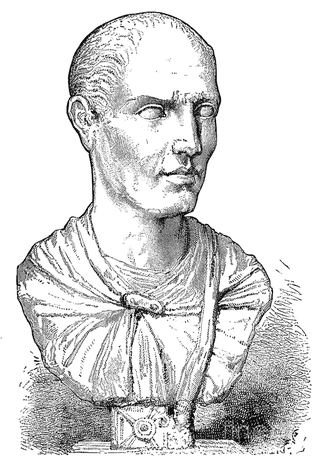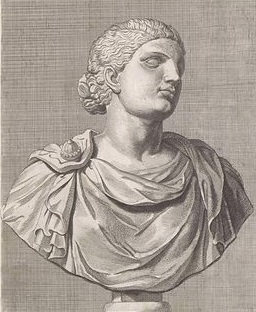Related Research Articles
Lucius Cornelius Cinna was a four-time consul of the Roman republic. Opposing Sulla's march on Rome in 88 BC, he was elected to the consulship of 87 BC, during which he engaged in an armed conflict – the Bellum Octavianum – with his co-consul, Gnaeus Octavius. Emerging victorious, Cinna initiated with his ally, Gaius Marius, extrajudicial killings of their personal enemies. In the aftermath, he dominated the republic for the next three years, serving continuously as consul.

Lucius Cornelius Sulla Felix, commonly known as Sulla, was a Roman general and statesman. He won the first large-scale civil war in Roman history and became the first man of the Republic to seize power through force.

Lucius Licinius Lucullus was a Roman general and statesman, closely connected with Lucius Cornelius Sulla. In culmination of over 20 years of almost continuous military and government service, he conquered the eastern kingdoms in the course of the Third Mithridatic War, exhibiting extraordinary generalship in diverse situations, most famously during the Siege of Cyzicus in 73–72 BC, and at the Battle of Tigranocerta in Armenian Arzanene in 69 BC. His command style received unusually favourable attention from ancient military experts, and his campaigns appear to have been studied as examples of skillful generalship.
Masters of Rome is a series of historical novels by Australian author Colleen McCullough, set in ancient Rome during the last days of the old Roman Republic; it primarily chronicles the lives and careers of Gaius Marius, Lucius Cornelius Sulla, Pompey the Great, Gaius Julius Caesar, and the early career of Caesar Augustus. It spans from January 1, 110 BC through to January 16, 27 BC.
Titus Pomponius Atticus was a Roman editor, banker, and patron of letters, best known for his correspondence and close friendship with prominent Roman statesman Marcus Tullius Cicero. Atticus was from a wealthy Roman family of the equestrian class and from the Pomponia gens.

The First Man in Rome is a 1990 historical novel by Australian author Colleen McCullough, and the first in her Masters of Rome series.
Lucius Cornelius Sisenna was a Roman soldier, historian, and annalist. He was praetor in 78 BC.

Gaius Marius "the Younger" was a Roman republican general and politician who became consul in 82 BC with Papirius Carbo. He fought in Sulla's civil war. He committed suicide that same year at Praeneste, after his defeat by Sulla and during the city's capture by Quintus Lucretius Afella.

The gens Quinctia, sometimes written Quintia, was a patrician family at ancient Rome. Throughout the history of the Republic, its members often held the highest offices of the state, and it produced some men of importance even during the imperial period. For the first forty years after the expulsion of the kings the Quinctii are not mentioned, and the first of the gens who obtained the consulship was Titus Quinctius Capitolinus Barbatus in 471 BC; but from that year their name constantly appears in the Fasti consulares.

Calpurnia was either the third or fourth wife of Julius Caesar, and the one to whom he was married at the time of his assassination. According to contemporary sources, she was a good and faithful wife, in spite of her husband's infidelity; and, forewarned of the attempt on his life, she endeavored in vain to prevent his murder.

The Asiatic Vespers refers to the massacres of Roman and other Latin-speaking peoples living in parts of western Anatolia c. early 88 BC by forces loyal to Mithridates VI Eupator, ruler of the Kingdom of Pontus, who orchestrated the massacre in an attempt to rid Asia Minor of Roman influence. An estimated 80,000 people were killed during the episode. The incident served as the casus belli or immediate cause of the First Mithridatic War between the Roman Republic and the Kingdom of Pontus.
"In Verrem" is a series of speeches made by Cicero in 70 BC, during the corruption and extortion trial of Gaius Verres, the former governor of Sicily. The speeches, which were concurrent with Cicero's election to the aedileship, paved the way for Cicero's public career.
Gaius Valerius Flaccus was a Roman general, politician and statesman. He was consul of the Roman Republic in 93 BC and a provincial governor in the late-90s and throughout the 80s. He is notable for his balanced stance during the Sullan civil wars, the longevity of his term as governor, and his efforts to extend citizenship to non-Romans.
Lucius Cornelius Chrysogonus was a Greek freedman of Lucius Cornelius Sulla whom Sulla put in charge of the proscriptions of 82 BC. He purchased the property of the proscribed Sextus Roscius Amerinus, worth 250 talents, for 2,000 denarii. Chrysogonus then accused Roscius's son, Sextus Roscius, of murdering his father. In 80 BC Chrysogonus was in turn accused of corruption by Marcus Tullius Cicero, who was defending Sextus Roscius during his trial. Very little is known of Chrysogonus after the trial.
Lucius Caecilius Metellus Delmaticus was a Roman politician and general. He was a son of Lucius Caecilius Metellus Calvus and brother of Quintus Caecilius Metellus Numidicus. He was consul in 119 BC; during his year, he opposed Gaius Marius' election procedures law. As consul and proconsul from 119–117 BC, he campaigned against the Dalmatians. For his victories, he triumphed in 117 BC, earning his cognomen and dedicating two temples – also contributing to repairs for the Temple of Castor and Pollux – from the spoils of war.
Lucius Valerius Flaccus was the suffect consul who completed the term of Gaius Marius in 86 BC. In the Roman Republic, Marius had fought a series of civil wars against Lucius Cornelius Sulla Felix, both leaders of their respective factions. Flaccus was considered a staunch supporter of Marius and Lucius Cornelius Cinna, the latter of whom shared his consulate and succeeded Marius as faction leader.
Claudia Marcella Minor (PIR2 C 1103, born some time before 39 BC) was a niece of the first Roman emperor Augustus. She was the second surviving daughter of the emperor's sister Octavia the Younger and her first husband Gaius Claudius Marcellus. Marcella had many children by several husbands, and through her son Marcus Valerius Messalla Barbatus she became the grandmother of the empress Messalina.
Julia, or possibly Ilia, was a Roman noblewoman who was the first wife of Sulla, later a Roman dictator.
De vita sua is an autobiography written by Marcus Aemilius Scaurus, a prominent statesman of the Roman Republic, notably consul in 115 BC and princeps senatus for a generation. Even though the book is lost and has only survived in seven small fragments, it is the first known autobiography in Roman history. Scaurus wrote his autobiography in order to defend his actions throughout his long career, during which he was at the centre of Roman politics, from the tribunates of Gaius Gracchus to the Social War, and engaged in bitter feuds with numerous enemies. Most scholars think that Scaurus wrote the autobiography towards the end of his life.
The Bellum Octavianum was a civil war of the Roman Republic, fought in 87 BC between the two consuls of that year, Gnaeus Octavius and Lucius Cornelius Cinna. Cicero gave it its name after the consul Octavius. It ended either in late 87 BC or early 86 BC and led directly to Sulla's civil war 4 years later.
References
- ↑ Konstantinos Kapparis: Prostitution in the Ancient Greek World
- ↑ Growing Up Fatherless in Antiquity
- ↑ Badian, Lucius Sulla, p. 6, says it was her "nom de guerre".
- ↑ The Poems of Catullus: A Bilingual Edition
- ↑ The Decline of the Roman Republic
- ↑ The First Man in Rome